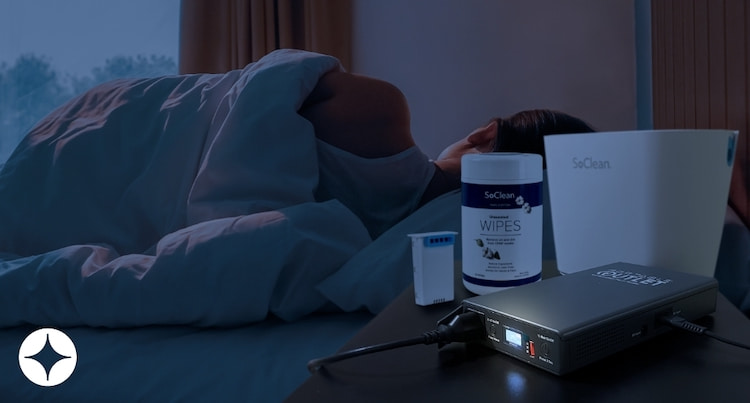
Keep your backup battery plugged in and your replacement accessories handy.
Winter has its own unique charm. But when it's paired with the snowstorms and extremely cold conditions, we all need to be prepared. However, this means more than just a well-stocked pantry — having safety and maintenance items close by is also beneficial, especially for those with health conditions such as a sleep disorder.
Therefore, to help you combat the season's challenges and keep safety and health intact, here's a carefully curated checklist.
1. Sleep Equipment and Supplies
Managing a sleep disorder often depends on specific equipment. Here are some essential items to keep your sleep therapy running smoothly:
- Sleep Equipment Machine and Accessories: Make sure your machine is in proper working condition and that you're well stocked on all of the accessories. Regular maintenance and cleaning are essential for optimal performance.
- Power Inverter or Portable Battery Pack: In case of power outages, have a power inverter or a portable backup battery -----on hand to ensure your sleep equipment continues to function uninterrupted.
- SoClean Device, Filter, Wipes, and Soap or Prewash: Keep your equipment clean with help from SoClean 3 Complete Bundle. This bundle, compatible with all popular sleep equipment brands & models, comes with a full year of filters included and FREE shipping.
- Extra Gallons of Distilled Water: Stock up on distilled water for your sleep equipment machine's humidifier to maintain comfortable and effective therapy.
2. Medications, Health Supplies & Emergency Contacts
As temperatures drop, health concerns tend to rise. Staying prepared with these essential medications, supplies, and contacts is vital.
- Essential Prescription Medications: Ensure you have an ample supply of your prescription medications, including any necessary medical supplies.
- Over-the-counter cold and Flu Medications: Be prepared for seasonal illnesses that might exacerbate your symptoms. Consult your doctor for appropriate options.
- Pain Relievers/Fever Reducers: Keep over-the-counter pain relievers and fever reducers for immediate relief from discomfort.
- Thermometer: Monitoring your body temperature is crucial; a reliable thermometer helps you track any potential health issues.
- Emergency Contacts: Compile a list of emergency contacts, including family, friends, and healthcare providers who are easily accessible for emergencies. Share this list with someone close to you.
- Copies of Important Medical Documents: Have copies of your insurance information, ID, and medical history readily accessible.
3. Bedroom Comfort and Safety
- Extra Blankets and Warm Bedding: Stay warm during colder nights with extra blankets and cozy bedding.
- Approved Space Heater: If approved by your healthcare provider, a space heater with safety features can help maintain a comfortable sleeping environment.
- Warm and Comfortable Sleepwear: Choose sleepwear that keeps you warm without causing discomfort.
- Non-Slip Slippers or Socks: Prevent falls by wearing non-slip footwear, especially when walking on cold surfaces.
- Bedside Lamp or Flashlight: Ensure you have a source of light within arm's reach in case of power outages.
4. General Emergency Supplies
- Battery-Powered Weather Radio: Stay informed about weather conditions and alerts even if the power goes out.
- Candles and Matches: Use these as a backup source of light if needed, but exercise caution.
- Non-Perishable Food and Bottled Water: Stock up on easy-to-prepare non-perishable foods and bottled water to sustain you during emergencies.
- First Aid Kit: A well-stocked first aid kit is essential for treating minor injuries.
5. Home Maintenance and Safety
- Adequate Insulation: Ensure your home is properly insulated to maintain a comfortable indoor temperature.
- Weather Stripping and Draft Blockers: Prevent drafts and heat loss by sealing doors and windows.
- Precautions Against Slips and Falls: Keep salt, sand, or ice melt handy to prevent slippery surfaces.
- Carbon Monoxide and Smoke Detectors: Test detectors and replace batteries to ensure they're in working order.
6. Personal Care and Hygiene
Winter often brings a harshness that affects our skin, hair, and overall personal hygiene. Here's a set of simple yet effective care routines and products to help.
- Hand Sanitizer and Hand-Warming Packs: Maintain good hygiene and keep your hands warm.
- Moisturizing Lotion and Lip Balm: Combat dry skin caused by cold weather.
- Extra Toiletries and Personal Care Items: Have a surplus of essential hygiene products.
7. Entertainment and Mental Well-being
Keep your mind engaged and relaxed during chilly winter days with these simple activities:
- Indoor Activities: Keep yourself engaged with books, puzzles, games, or other indoor hobbies.
- Relaxation Tools: Use meditation apps, calming music, or aromatherapy to promote relaxation.
8. Communication
Staying connected during winter emergencies is important, ensuring you can reach out for help if needed. Therefore, make sure you have the following:
- Fully Charged Cell Phone: Keep your cell phone charged and loaded with emergency contact numbers.
- List of Nearby Shelters and Community Resources: Familiarize yourself with nearby shelters and support services. This will help you or a loved one find help when needed.
9. Have an Emergency Plan
Winter weather emergencies can strike without much notice. Make sure to formulate a winter weather emergency plan with instructions for medical care, transportation, and communication.
Tailor this list according to your specific health needs and the severity of winter weather in your region — and remember to consult your healthcare provider before making any changes to your equipment or treatment plan.
With proper planning, you can face the challenges of winter with minimal worries and ensure that you maintain good sleep health, and general well-being all season long.




